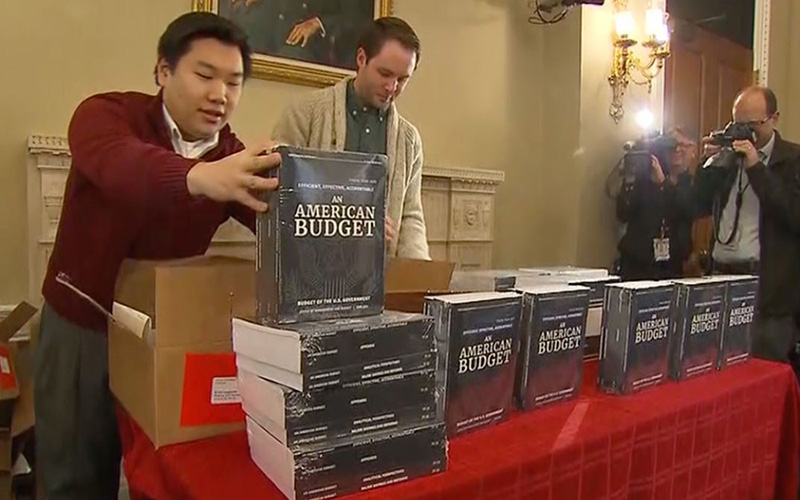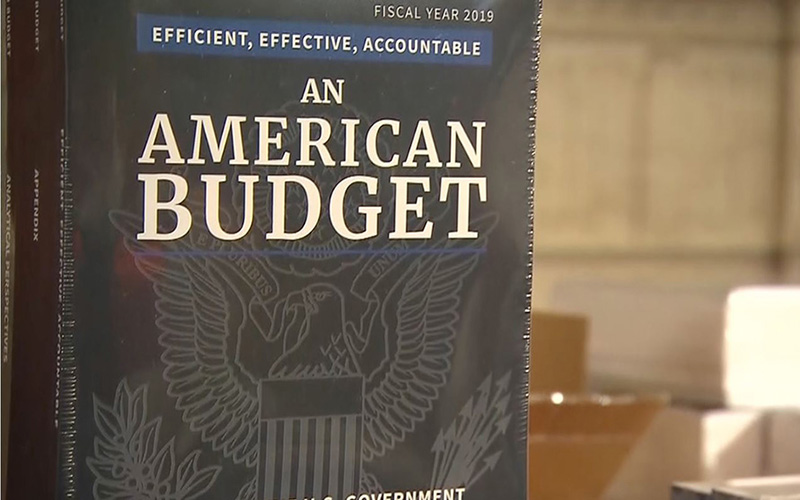
Workers unpack boxes of President Donald Trump’s proposed $4.4 trillion fiscal 2019 budget for distribution to members of Congress on Monday. (Photo by CNN/Newsource)

President Donald Trump’s fiscal 2019 budget cuts funding to most federal agencies while boosting defense and calling for $18 billion for a border wall. (Photo courtesy CNN Newsource)
WASHINGTON – Some Arizona Democrats were labeling the Trump administration’s proposed $4.4 trillion fiscal 2019 budget “disastrous” Tuesday and a “slap in the face to Americans across the country.”
The budget released Monday cuts spending in 10 of 13 executive departments, and calls for reductions to Medicaid and repeal of the Affordable Care Act, while increasing military spending and boosting the federal deficit to $964 billion next year.
“With one in four Arizona residents relying on Medicaid for health care, the effects of Trump’s budget cuts to that program alone would be disastrous for our residents,” said Rep. Raul Grijalva, D-Tucson, in a statement from his office Tuesday.
Grijalva, noting that the budget calls for $18 billion for 65 miles of border wall in Texas, said a budget that “prioritizes a border wall over health care, education, nutrition and anti-poverty programs is bad news for the people of Arizona.”
While Democrats criticized budget’s “unrealistic demands,” Rep. Paul Gosar, R-Prescott, called it “good start” – welcoming the higher defense spending but saying Congress still needs to work toward fiscal accountability.
“I want to make sure that we are starting to pay off our deficits and balancing our budget so we don’t make it worse,” said Gosar, a self-described fiscal hawk. “That’s the biggest key I want to see, is doing the budget responsibly, making sure it’s balanced and starting to make some money back for the Treasury to get us out of this debt crisis.”
In briefings on the budget this week, White House Office of Management and Budget Director Mick Mulvaney has acknowledged that, under current projections, the federal budget will not be balanced in the next 10 years.
“We don’t balance it in the 10-year window,” he said in a Monday briefing. “What we do do, however, is we’re able to turn the tide, to turn the trajectory.”
Despite the current increase in the deficit, Mulvaney said the White House plan could result in $3 trillion in savings over the next decade.
“There is a way to get off of this treadmill of trillion-dollar deficits, but we have to take the spending side extraordinarily seriously,” he said.
-Cronkite News graphic by Kyley Schultz
A White House summary of the budget shows a 34 percent cut to the Environmental Protection Agency budget since fiscal 2017, the steepest among federal agencies. Programs that would see cuts include the Supplemental Nutrition Assistance Program, or food stamps, and a $3.7 billion reduction to the Agriculture Department.
Rep. Tom O’Halleran, D-Sedona, said the budget “breaks a promise to rural America” as well as veterans and seniors, all of whom “need more tools, not less, to be a part of the economic recovery and create new jobs.”
“This budget slashes the few tools that rural communities depend on to develop, attract, and retain a strong workforce and good jobs,” O’Halleran said in a statement Monday.
But Mulvaney defended the planned $17.2 billion reduction in SNAP funding over the next decade, said the administration’s would focus on a “food box program” rather than giving cash vouchers to food-stamp recipients – which included 14 percent of Arizona residents in 2016.
“What we do is propose that, for folks who are on food stamps … part of their benefits come in the actually sort of – and I don’t want to steal somebody’s copyright – but a Blue Apron-type program, where you actually receive the food instead of receive the cash,” he said in Monday’s briefing.
Along with cuts in most agencies, the budget’s call for border wall funding angered Grijalva.
“If Trump is serious about making America great again, he should be investing more in programs and services that help people – not funding a ridiculous border wall at the expense of programs they rely upon,” Grijalva’s statement said.
Center on Budget and Policy Priorities President Robert Greenstein called the budget request “unrealistic,” saying it “would widen inequality, worsen poverty and hardship, and further divide the country.”
“The president continues to assume much larger impacts on economic growth and federal revenue from his tax-cutting and other policies than non-partisan experts find likely,” Greenstein said in a statement Monday. “We expect the Congressional Budget Office’s assessment of the budget to again show its fiscal claims to be unreliable.”
Gosar said it will be up to Congress to produce a fiscally responsible budget.
“I think this is a good template and a start, but the big deal is what is Congress going to do?” he said Tuesday. “They talk big, but where are we going to make the differences in Congress?”